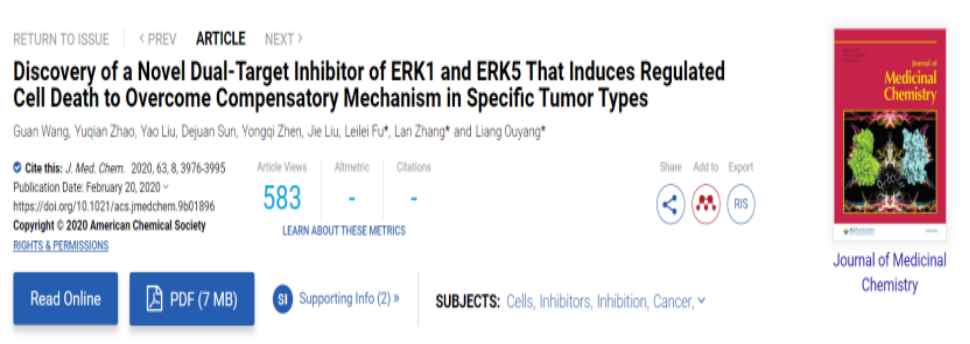ERK1 and ERK5 belong to the MAPK family and participate in a variety of cell biological processes. ERK signaling cascade is activated in more than 80% of tumors. Recent studies have shown that ERK5 can provide a compensation pathway after the failure of ERK1 signal transduction, thereby saving tumor cell proliferation. In order to overcome the compensation mechanism caused by ERK5, the design of ERK1/5 dual-targeted inhibitors is expected to overcome the current drug resistance problems of ERK inhibitors in clinical applications.
Recently,associateprofessor Leilei Fu andassociateprofessor Lan Zhan from school of life science and engineering of Southwest Jiaotong University andprofessor Liang Ouyang ofstatekeylaboratory of biotherapy of Sichuan University proposed a treatment strategy that simultaneously targeted ERK1 and ERK5, and reported the first small molecule inhibitor ERK1 / ERK5 double target, which provided a new treatment strategy for tumor treatment.
|
|
|

|
Firstly, the researchers accurately classified all tumor types in TCGA based on the expression levels of ERK1 and ERK5, proposed a treatment strategy that simultaneously targets ERK1 and ERK5, and selected gastric cancer, acute myeloid leukemia and cervical cancer for research. Next, a lead compound with better activity was screened through the computer-aided drug design method, and a series of candidate compounds were designed and synthesized from the structural space of the lead compound using a structure-based optimization design strategy. Through structure-activity relationship studies, the researchers obtained the first small molecule inhibitor ADTL-EI1712 that selectively targets ERK1/ERK5, and used KINOMEscan and siRNA interference experiments to further confirm its targeting. The inhibitor can regulate the cell death and autophagy of gastric cancer cell MKN-74. It shows good anti-tumor activity in both in vivo and in vitro models, and exhibits good tumor specificity and pharmacokinetic properties. It has a good development prospect.
|
|
|

|
The above results were published as a cover article in the Journal of Medicinal Chemistry, an important academic journal in the field of medicinal chemistry. Associate professor Leilei Fu,associateprofessor Lan Zhang andprofessor Liang Ouyang of Sichuan University are the co-corresponding authors. Our doctoral student Yongqi Zhen participated in part of the work. This research work was also supported by the National Natural Science Foundation of China (81602627, 81602953).
Original link: https://pubs.acs.org/doi/10.1021/acs.jmedchem.9b01896